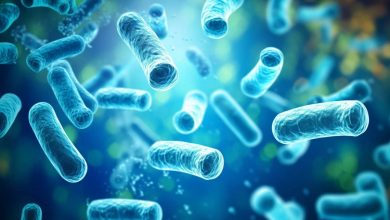
Poor Sleep May Up Obesity Risk
النوم السيئ وغير المنتظم قد يزيد من خطر السمنة
Poor sleep or working night shifts may lead to excessive weight gain, reports a new study. The findings of the study are published in the scientific journal Science Advances.
Poor Sleep May Up Obesity Risk
In a new study, researchers at Uppsala University now demonstrate that one night of sleep loss has a tissue-specific impact on the regulation of gene expression and metabolism in humans. This may explain how shift work and chronic sleep loss impairs our metabolism and adversely affects our body composition.
‘People who suffer from chronic sleep loss or who carry out night shift work are more likely to put on weight. Disrupted sleep can alter the metabolism and increases the body’s ability to store fat.’
Epidemiological studies have shown that the risk for obesity and type 2 diabetes is elevated in those who suffer from chronic sleep loss or who carry out shift work. Other studies have shown an association between disrupted sleep and adverse weight gain, in which fat accumulation is increased at the same time as the muscle mass is reduced – a combination that in and of itself has been associated with numerous adverse health consequences.
Researchers from Uppsala and other groups have in earlier studies shown that metabolic functions that are regulated by, e.g., skeletal muscle and adipose tissue are adversely affected by disrupted sleep and circadian rhythms. However, until now it has remained unknown whether sleep loss per se can cause molecular changes at the tissue level that can confer an increased risk of adverse weight gain.
In the new study, the researchers studied 15 healthy normal-weight individuals who participated in two in-lab sessions in which activity and meal patterns were highly standardized.
In randomized order, the participants slept a normal night of sleep (over eight hours) during one session and were instead kept awake the entire night during the other session. The morning after each night-time intervention, small tissue samples (biopsies) were taken from the participants’ subcutaneous fat and skeletal muscle. These two tissues often exhibit disrupted metabolism in conditions such as obesity and diabetes.
At the same time in the morning, blood samples were also taken to enable comparison across tissue compartments of a number of metabolites. These metabolites comprise sugar molecules, as well as different fatty and amino acids.
The tissue samples were used for multiple molecular analyses, which first of all revealed that the sleep loss condition resulted in a tissue-specific change in DNA methylation, one form of mechanism that regulates gene expression.
DNA methylation is a so-called epigenetic modification that is involved in regulating how the genes of each cell in the body are turned on or off, and is impacted by both hereditary as well as environmental factors, such as physical exercise.
“Our research group were the first to demonstrate that acute sleep loss in and of itself results in epigenetic changes in the so-called clock genes that within each tissue regulate its circadian rhythm.
Our new findings indicate that sleep loss causes tissue-specific changes to the degree of DNA methylation in genes spread throughout the human genome. Our parallel analysis of both muscle and adipose tissue further enabled us to reveal that DNA methylation is not regulated similarly in these tissues in response to acute sleep loss,” said Jonathan Cedernaes who led the study.
“It is interesting that we saw changes in DNA methylation only in adipose tissue, and specifically for genes that have also been shown to be altered at the DNA methylation level in metabolic conditions such as obesity and type 2 diabetes.
Epigenetic modifications are thought to be able to confer a sort of metabolic “memory” that can regulate how metabolic programmes operate over longer time periods. We, therefore, think that the changes we have observed in our new study can constitute another piece of the puzzle of how chronic disruption of sleep and circadian rhythms may impact the risk of developing for example obesity,” notes Jonathan Cedernaes.
Further analyses of, e.g., gene and protein expression demonstrated that the response as a result of wakefulness differed between skeletal muscle and adipose tissue. The researchers say that the period of wakefulness simulates the overnight wakefulness period of many shift workers assigned to night work.
A possible explanation for why the two tissues respond in an observed manner could be that overnight wakefulness periods exert a tissue-specific effect on tissues’ circadian rhythm, resulting in misalignment between these rhythms. This is something that the researchers found preliminary support for also in this study, as well as in an earlier similar but smaller study.
“In the present study, we observed molecular signatures of increased inflammation across tissues in response to sleep loss. However, we also saw specific molecular signatures that indicate that the adipose tissue is attempting to increase its capacity to store fat following sleep loss, whereas we instead observed signs indicating a concomitant breakdown of skeletal muscle proteins in the skeletal muscle, in what’s also known as catabolism.
We also noted changes in skeletal muscle levels of proteins involved handling blood glucose, and this could help explain why the participants’ glucose sensitivity was impaired following sleep loss. Taken together, these observations may provide at least partial mechanistic insight as to why chronic sleep loss and shift work can increase the risk of adverse weight gain as well as the risk of type 2 diabetes,” said Jonathan Cedernaes.
The researchers have only studied the effect of one night of sleep loss, and therefore do not know how other forms of sleep or disruption of circadian misalignment would have affected the participants’ tissue metabolism.
“It will be interesting to investigate to what extent one or more nights of recovery sleep can normalize the metabolic changes that we observe at the tissue level as a result of sleep loss. Diet and exercise are factors that can also alter DNA methylation, and these factors can thus possibly be used to counteract adverse metabolic effects of sleep loss,” said Jonathan Cedernaes.
Source: Eurekalert
كشفت دراسة حديثة أن النوم السيئ وغير المنتظم يغير طريقة عمل الحمض النووي لدى الأشخاص، ويجعل الجسم أكثر قابلية لتخزين الدهون.
ووجد الباحثون أن العضلات تصبح أصغر حجما وتبدأ كميات الدهون المخزنة في الجسم بالارتفاع، عندما يعاني الأشخاص من قلة النوم في ليلة واحدة فقط.
وفي الماضي، ربط الباحثون قلة النوم بزيادة الوزن، ولكنهم وجدوا صعوبة في تفسير هذه الظاهرة. والآن، اكتشفوا أنه يمكن ربطها بساعة الجسم، في الوقت الذي يصبح فيه الجسم أقل قدرة على التعامل مع السكر في الدم، ما يزيد من مخاطر الإصابة بالسكري من النوع الثاني.
ويمكن أن يغدو هذا الاكتشاف مهما في المساعدة على محاربة زيادة الوزن حول العالم، والتي تساهم في الإصابة بالأمراض الخطيرة والوفيات المبكرة.
وقام باحثو جامعة أوبسالا في السويد بإجراء دراسة شملت 15 شخصا، قاموا باختبارهم بعد نوم ليلة كاملة، وكذلك بعد قضاء ليلة بلا نوم. وأخذوا عينات من الأنسجة الدهنية والعضلية، كما جمعوا الدم من المشاركين ذوي الوزن الصحي، ووجدوا أن طريقة عمل الحمض النووي قد تغيرت.
وبعد ليلة نوم سيئة واحدة فقط، تبدأ الجينات بتشجيع الجسم على تخزين المزيد من الدهون والتخلص من قوة العضلات.
وقال معد الدراسة، جوناثان سيدرنيس: “نعتقد أن التغييرات التي لاحظناها يمكن أن تشكل جزءا آخر من لغز كيفية تأثير اضطراب النوم المزمن على خطر تطور السمنة”.
ويبدو أن قرار الجسم بتخزين المزيد من الدهون عندما يكون الشخص مرهقا، يرتبط بتغير إيقاع الساعة البيولوجية للخلايا، المعروف باسم ساعة الجسم.
ويقول الباحثون إنه عندما يتم تغيير أوقات النوم، تتعطل طريقة استخدام الحمض النووي من قبل الجسم. كما أوضحوا أن نتائجهم مهمة لأن ارتفاع مستويات الدهون في الجسم، يزيد من خطر أهم أسباب الوفاة في العالم، وهي السرطان وأمراض القلب والسكتة الدماغية.
كما وجدت الدراسة أن حساسية الناس لسكر الدم تتضاءل عندما يكونون متعبين، ما يوحي بأن أولئك الذين لا ينامون جيدا، أكثر عرضة للإصابة بمرض السكري من النوع الثاني.
ونُشرت النتائج في مجلة Science Advances.



